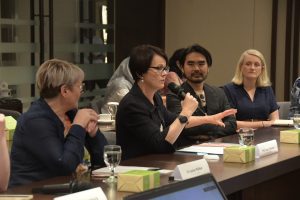
Jakarta, Indonesia – 13 June 2024 The health roundtable held last week in Jakarta between representatives of the Indonesian Chamber of Commerce and Industry (KADIN Indonesia) and the University of Nottingham (UoN) marks a new chapter in the joint efforts to improve maternal and infant health in Indonesia. This event coincided with the visit of the delegation from this top 20 UK university to Indonesia. Organised by Equatorise, a London-based consultancy firm that accelerates Indonesian and ASEAN companies to expand in Europe and the UK, the roundtable highlighted critical areas for collaboration and produced concrete steps to address gaps in maternal healthcare.
The roundtable, coinciding with UoN’s visit to Indonesia on 6 June, brought together experts from UoN and representatives from KADIN Indonesia. The experts presented their findings on maternal health disparities in Indonesia and proposed innovative solutions, including genomic technology for personalised care and big data analysis to improve birth outcomes.

Opening the session, Steven Marcelino, the UK & Ireland Bilateral Committee at KADIN and Managing Partner & CEO of Equatorise Advisory, said “Addressing these challenges is paramount to improve the health and well-being of the population and prepare for Indonesia’s Golden Generation in 2045. Leveraging genomic technologies in maternal and child care will provide personalised care and interventions that can prevent complications and improve health outcomes for mothers and children.”
Professor Jane E. Norman, Provost and Deputy Vice-Chancellor of the University of Nottingham, highlighted the need for special attention to pregnancy-related healthcare, stating, ‘Pregnancy and maternal health is an underdeveloped field. An example is the repurposing of Viagra to develop therapies that prevent premature muscle contractions during labour, emphasising the importance of improving labour timing to prevent stillbirths and preterm births. Unfortunately, regulations hinder pharmaceutical companies, making it unprofitable for them to invest in pregnancy-related medications as the nine-month duration is too short compared to chronic conditions like heart disease, despite the high stakes involved. As a result, mothers often do not receive the necessary medications. Over the past 20 years, only a few drugs have been developed for pregnancy compared to heart diseases and others.’
To address this, she suggested utilising big data analysis and diagnostic tools such as ultrasound training programmes to improve birth outcomes and reduce regional disparities in healthcare access.
Dr. Louise Walker, Associate Professor of Midwifery/Professional Lead, Faculty of Medicine & Health Sciences at the University of Nottingham, added, ‘Standardising midwifery education and practices in Indonesia is crucial for improving maternal health outcomes. Infant feeding initiatives, such as the UNICEF baby-friendly initiative, are vital. Breastfeeding offers many benefits, including reduced risks of obesity, diabetes, and breast cancer. We also need comprehensive research on the impact of postnatal care on women and newborns.’
Collaboration to Enhance Access and Education
- Michael Rampangilei, Health Legacy Lead of ASEAN Business Advisory Council (ASEAN BAC) and Head of Health Innovation Permanent Committee at KADIN; COO of Pathgen Diagnostik, added, ‘The field of midwifery is still underdeveloped, and there is an increasing incidence of postpartum depression, known as baby blue syndrome. The partnership between the NHS and the Indonesian Ministry of Health aims to revamp healthcare education. Prenatal screening (NIPT) and the recent health bill are essential for increasing the use of ultrasound in primary healthcare. Regulatory reforms are needed to allow more healthcare professionals to perform diagnostic tasks. KADIN’s communication channels with state-owned pharmaceutical and financial institutions support stunting education.’
Dr. dr Ivan Sini, President Commissioner of Bundamedik Healthcare System (BMHS), acknowledged the country’s demographic diversity and the ongoing transformation in healthcare access through the BPJS programme, also emphasising the importance of international collaboration to enhance resources and innovation in healthcare services. Challenges such as a shortage of healthcare professionals and significant educational disparities need to be addressed through cooperation with international partners.
In response to these challenges, Dr. Ivan Sini proposed several potential areas for collaboration, including:
- Evaluation and management of pre-pregnancy
- Early detection of pregnancy complications
- Early childhood development in the first 1000 days of life
- Development of innovative and cost-effective treatments
- Exploration of genomic applications in healthcare
Concrete Steps Forward
At the end of the discussion, Dr. Bagus Muljadi, Assistant Professor at the University of Nottingham reiterated that ‘The University of Nottingham is strongly committed to fostering partnerships and collaborations with Indonesian institutions such as UI, ITB, and UGM, through initiatives like UKICIS. Our goal is to enhance research and development capabilities, facilitating joint growth and innovation. We are very enthusiastic about the development of a translation centre in West Java, which will be a hub for translating academic research into practical applications. This centre will focus on critical areas such as medical technology, data analysis, and health solutions tailored to local needs.’
The roundtable discussion resulted in several concrete steps to be taken by both parties, including:
- Exploring opportunities for multi-country research projects
- Standardising midwifery practices
- Advocating for increased funding for maternal health
- Developing frameworks to support the use of diagnostic tools in rural areas
- Continued discussions on innovative treatments and health education improvements
The health discussion between Indonesia and Nottingham demonstrates a strong commitment from both sides to work together and address critical gaps in maternal healthcare in Indonesia. Going forward, Equatorise is open to realising concrete steps of collaboration between Indonesia and the UK. By leveraging research expertise and a spirit of collaboration, positive changes can be made to improve the health and well-being of mothers and babies in Indonesia.



